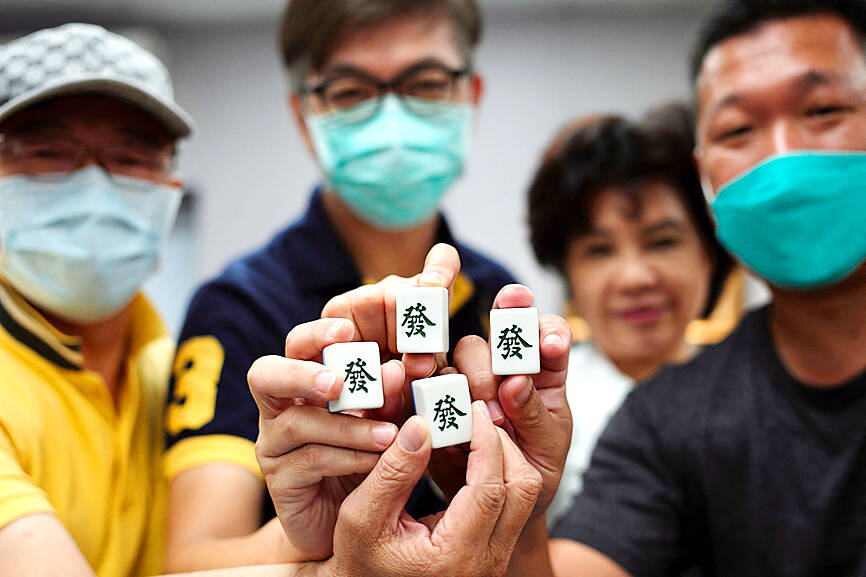As Taiwan hurtles toward becoming a super-aged society, a new political party has emerged with an unusual and somewhat singular platform — making mahjong great again.
While playing the centuries-old game is legal, it has been treated with suspicion by authorities for its association with gambling in public gaming rooms, which is prohibited.
Organized crime groups have long maintained a lucrative side hustle by hosting illegal betting matches, while gaming parlors — some legitimate, some not — often find themselves raided or inspected by police.

Photo: Sam Yeh, AFP
Kuo Hsi (郭璽), a 65-year-old owner of a mahjong parlor in Kaohsiung, has decided it is time to allow betting on mahjong games, and launched a new party toward that goal.
The Mahjong the Greatest Party wants the game declared a “legitimate recreation,” and for gambling and prize money to be allowed.
“Let’s be frank. You can put a bet on anything if you want to gamble. Even rock, paper, scissors,” he said in an interview at his parlor. “Why do we insist on branding mahjong as a form of gambling?”
“Any form of competition — gaming, golf, tennis, badminton — they all have some form of prize in the end. They all do. When there are prizes, competitors will do their best to train themselves physically and mentally. Mahjong playing is exactly the same,” he said.
Max Chang, 31, a gaming consultant who has been playing mahjong with his family since he was young, is among the party’s first members.
“I identify very much with Kuo’s ideals. As a young man who plays mahjong frequently, I am always wary about people calling the police on us,” he said.
Echoing that sentiment, 62-year-old housewife and party member Amy Huang said: “I look forward to playing mahjong openly and not having to hide.”
Huang said her mother-in-law, who taught her how to play, was taken to a police station once for betting in a game with friends, an incident she described as “ridiculous.”
Kuo knows he has some way to go to break into Taiwan’s political mainstream.
The current membership of the party, which was founded last month, is 120 people, but he said he is optimistic that he can get 10,000 registered party members by the end of this year.
Kuo has applied to authorities to register the party and is hopeful that it can be approved soon.
He aims to get enough political momentum going to secure a referendum next year to amend the law.
Kuo also hopes to secure at least one lawmaker-at-large seat in national elections in 2024.
As a parlor owner, Kuo has strong business reasons to see mahjong gambling allowed and regulated, but he also has a more altruistic goal, believing that bringing mahjong out of a gray area could help Taiwan’s elderly people live happier, more sociable lives.
Nearly 17 percent of Taiwan’s population is over 65.
The nation is projected to join Japan and reach “super-aged” status in 2025, when that proportion reaches 20 percent.
“Taiwan is an aging society with more and more senior citizens, especially in remote areas, and they mostly stay at home watching TV,” Kuo said.
“If they can get together with people of their age to play mahjong, to chat with others, it will help improve their quality of life and bring happiness,” Kuo said. “This is a good activity for them.”

Taiwan is stepping up plans to create self-sufficient supply chains for combat drones and increase foreign orders from the US to counter China’s numerical superiority, a defense official said on Saturday. Commenting on condition of anonymity, the official said the nation’s armed forces are in agreement with US Admiral Samuel Paparo’s assessment that Taiwan’s military must be prepared to turn the nation’s waters into a “hellscape” for the Chinese People’s Liberation Army (PLA). Paparo, the commander of the US Indo-Pacific Command, reiterated the concept during a Congressional hearing in Washington on Wednesday. He first coined the term in a security conference last

Prosecutors today declined to say who was questioned regarding alleged forgery on petitions to recall Democratic Progressive Party (DPP) legislators, after Chinese-language media earlier reported that members of the Chinese Nationalist Party (KMT) Youth League were brought in for questioning. The Ministry of Justice Investigation Bureau confirmed that two people had been questioned, but did not disclose any further information about the ongoing investigation. KMT Youth League members Lee Hsiao-liang (李孝亮) and Liu Szu-yin (劉思吟) — who are leading the effort to recall DPP caucus chief executive Rosalia Wu (吳思瑤) and Legislator Wu Pei-yi (吳沛憶) — both posted on Facebook saying: “I

The Ministry of Economic Affairs has fined Taobao NT$1.2 million (US$36,912) for advertisements that exceed its approved business scope, requiring the Chinese e-commerce platform to make corrections in the first half of this year or its license may be revoked. Lawmakers have called for stricter enforcement of Chinese e-commerce platforms and measures to prevent China from laundering its goods through Taiwan in response to US President Donald Trump’s heavy tariffs on China. The Legislative Yuan’s Finance Committee met today to discuss policies to prevent China from dumping goods in Taiwan, inviting government agencies to report. Democratic Progressive Party Legislator Kuo Kuo-wen (郭國文) said

Sung Chien-liang (宋建樑), who led efforts to recall Democratic Progressive Party (DPP) Legislator Lee Kun-cheng (李坤城), was released on bail of NT$80,000 today amid outcry over his decision to wear a Nazi armband to questioning the night before. Sung arrived at the New Taipei District Prosecutors’ Office for questioning in a recall petition forgery case last night wearing a red armband bearing a swastika, carrying a copy of Adolf Hitler’s Mein Kampf and giving a Nazi salute. Sung left the building at 1:15am without the armband and covering the book with his coat. Lee said today that this is a serious